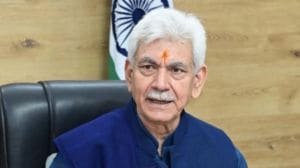The soldier-poet who went with Sir
Even as former President Narayanan’s remains were merging with the elements, his ADC of five years, Major Gopendra Singh Rathore fell t...

Even as former President Narayanan’s remains were merging with the elements, his ADC of five years, Major Gopendra Singh Rathore fell to a terrorist attack in Kashmir. It is as if Gopi, as we knew him, had stepped into the journey that was taking “Sir” into the Great Unknown.
I knew the moment I saw him enter my room for an interview of prospective AsDC to President Narayanan that this young officer of the Garhwal Rifles had walked into the appointment. I asked the interviewee what his hobbies were outside of soldiering. “Reading, Sir,” was the clipped reply. “English, I suppose?”
“Both English and Hindi, Sir.”A couple of supplementary queries showed the breadth of his mental library.
Gopi was exceptional in every sense. His bronzed frame stood out and above everyone on uniformed duty in Rashtrapati Bhavan. His marching steps were perfect, his standing stance behind the President could not be bettered.
Where others on ceremonial duty at an investiture or swearing-in might momentarily move a muscle, relax an eyebrow, take a quick and shallow gulp, Gopi would remain frozen like the mustard pillars of the Durbar Hall, eyes fixed into the far horizon. Where others might walk briskly, Gopi would sprint. Where others would take the stairs with agility, he would bound. And do all this non-competitively.
He competed only against his own standards. And those kept rising. Gopi seemed to know the value of time. He would laugh in bellows of happiness, smoke off-duty with gusto. And the phrase “to the lees” applied to Gopi most appropriately in the convivial warmth of the bar. There were no half-way houses for this Garhwali rifleman. The library in Lutyens’ great edifice was gone through by Gopi. Not in some brainless guzzling but with sensitive discrimination. He would mention, in passing, some oddity of style he had come by, a quote he had run into. And all the while, he wrote.
“Writing, yes, of course, Gopi, but poetry. Do you think soldiering and…” Before I could complete my sentence, he said “Yes, I know, Sir, some people might think writing poetry is a soft activity. But it is not—you know that, Sir.”
And he wrote remarkably fine verse in Hindi, well-crafted, polished, rounded in thought, syntax and rhyme.
After I left the President’s secretariat in 2000 for Sri Lanka, Gopi stayed in touch by correspondence. He went on to the staff college at Wellington for a year’s course that he enjoyed but wrote saying he longed to get back to active field service and in Kashmir.
The last letter from Gopi that I received (in Kolkata) said “Abhi vadi men hun aur inshallah ek sal aur rahunga. And then went on to say that while he had served in the Valley earlier, he had not noticed the vividness of its natural colours. He said his work was mainly in the field but whenever possible, he was able to make some time for reading and was making a special study of the Holy Qur’an in an English translation and some commentaries on Islam.
This was what can be called a “routine” bit of news about himself. But what followed made me think. “Some years ago,” Gopi said, “my line of thinking was that (in Kashmir) all that history can do, it has done. But now I feel that many new beginnings (kayi nayi punaravrittiyan) need to be made and that many new time-space seriations (navin ghatana-kram) are yet to occur.”
His final sentence on that theme was made of sagacious material. “I feel that enlightened thinking (roshan khyali) and the spirit of accommodation will have to emerge as a powerful ideological initiative.”
Gopi was a stylist in Hindi and I have translated his lines here only because this piece is being written in English. He ended by saying, as a good soldier, “Shayad adhik kah chuka huun par hamesha laga hai ki apse kah sakta huun.” In Gopi’s going we have gained a martyr. But for me, he’ll not be a cardboard icon. He will be a soldier who thought above and looked with an even eye beyond the lines of barracks and battlements into that far horizon where a roshan khyali waits.






- 01
- 02
- 03
- 04
- 05

























